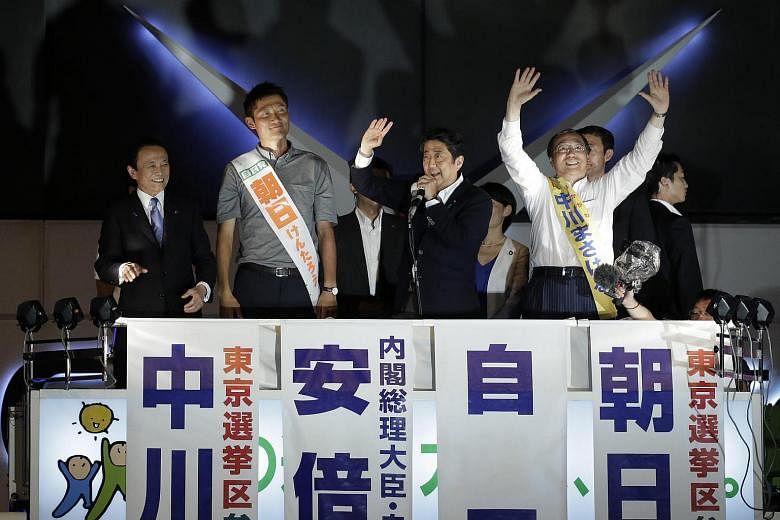TOKYO (Bloomberg) - Voting began Sunday (July 10) for an election to Japan's upper house that Prime Minister Shinzo Abe has billed as a chance to pass judgment on his economic policies.
Opposition parties, however, are focused on preventing a resounding victory for the premier that would allow him to take the next step toward revising the pacifist constitution.
Polling stations opened at 7am Tokyo time (6am Singapore time) and will close at 8pm, with media exit polls generally published immediately afterwards and official results later in the evening.
Media surveys show Abe's Liberal Democratic Party and its junior coalition partner Komeito are likely to win a simple majority of the 121 seats in contention. With support from two smaller conservative parties, the premier has a good chance of gaining the two-thirds of seats in the chamber needed to embark on constitutional change.
An election in the less powerful upper house doesn't affect Abe's position as premier, which he has held since a lower house victory in 2012. He doesn't have to call another general election until 2018. Half the seats in the upper house are contested every three years, with upper house lawmakers serving six-year terms.
The main opposition Democratic Party, led by Katsuya Okada, formed an unprecedented collaboration with the Japanese Communist Party in an attempt to pool the votes of those opposed to Abe.
The parties avoided having candidates run against one another in many districts, a strategy that may enable them to oust Justice Minister Mitsuhide Iwaki from his seat in Fukushima. That area is still recovering from the 2011 nuclear disaster.
Abe Speech
Abe has said he's seeking a mandate to press ahead with policies aimed at expanding the size of the economy to 600 trillion yen (about US$6 trillion) from 500 trillion yen, after last month's announcement that he's delaying a planned increase in the sales tax.
In his final campaign rally on Saturday evening, Abe focused on the economy, and hit out at the Communists. He stressed the need to strengthen the nation's security, but didn't raise the issue of constitutional revision.
"We are going to create a Japan that everyone thinks is doing well. To do this, we have to keep strongly pushing forward," Abe told supporters in Akihabara, central Tokyo. "Everyone will feel the economy's recovery."
Polls show the majority of voters don't think they have benefited from Abe's economic policies in the three-and-a-half years since he took office. Nevertheless, they are likely to opt for continuity, according to Katsunori Kitakura, lead strategist at Sumitomo Mitsui Trust Group.
"From an economic standpoint, disorder in the financial markets and concerns over a downturn in the global economy, especially following the fallout of the EU referendum, will influence voter sentiment," Kitakura said in a note to clients.
The ruling coalition's emphasis on fiscal stimulus is "likely to gain the support of the electorate."
The election will be the first national poll since the voting age was lowered to 18 from 20, adding about 2.4 million people to the electoral roll and bringing it to a total of about 107 million.
It is unclear how this will affect the results, because turnout rates tend to be low among young people. In the 2014 lower house election, 32.6 per cent of people in their 20s voted, compared with 68 per cent of those in their 60s.
The expected low overall turnout on Sunday likely will work in the LDP's favor.
It is unclear when, or if, Abe would tackle the pacifist Article 9 of the constitution, given reluctance from the LDP's Buddhist-backed coalition partner and a large proportion of the public. A poll published by the Mainichi newspaper in May found 52 per cent of respondents were against changing it, compared with 27 per cent who were in favour.
Eriko Ito, a 60-year-old supporter at Abe's rally on Saturday, said the prime minister should waste no time in revising the constitution.
"I want a revision during Abe's term in office," she said. "It's not just about war, we face many risks."
Legislation passed last year to expand the role of Japan's armed forces amid a territorial standoff with an increasingly assertive China sparked a series of large protests in Tokyo.
"A vote for the LDP is a vote to destroy Article 9," Communist Party leader Kazuo Shii said in a speech Thursday. "Mr. Abe is trying to create a country that fights wars overseas. His first step was the security legislation and he will try to go further with the second step of changing Article 9 of the constitution. We must not allow this."

